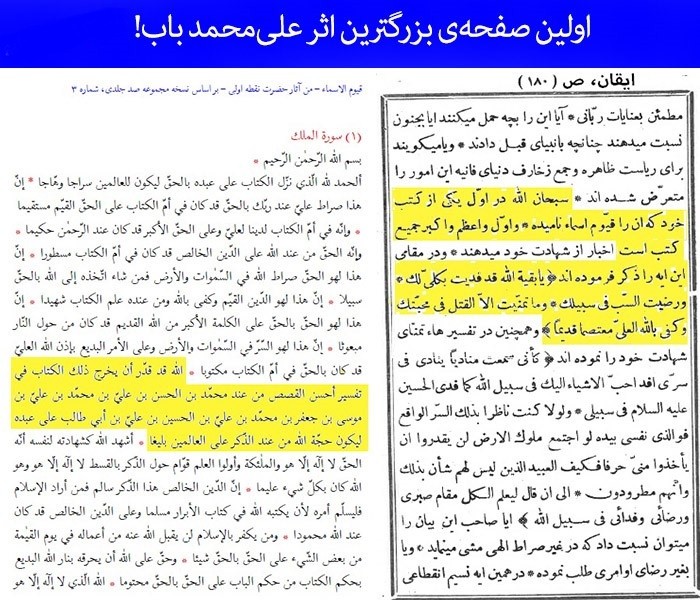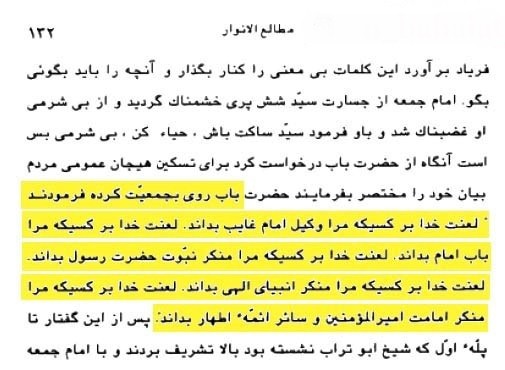The interpretation of Yosof chapter or the book Qayyoumul Asma is the title of a work which is considered as the greatest work by Ali Muhammad Bab according to the self-proclaimed prophet of Baha’ism and Shoqi Effendi. In the first page of his greatest work, Ali Muhammad Shirazi has mentioned Muhammad Ibn Al-Hassan Al-Askari (P.H.), the 12th Imam of Shiites as his leader and the forerunner of Babism!

The book Qayyumul Asma or the interpretation of Yosof chapter has been written and presented for Mulla Hussein Boshtouyee to believe in. the book is the interpretation of the first verses of chapter Yosof.[1]
The self-proclaimed prophet of Baha’ism has considered the book Qayyoumul Asma as the first and greatest work by Ali Muhammad Bab in his book the Iqan[2]. Shoqi Effendi has also assumed it as the same as the holy Quran in its rank.[3]
However, it is interesting to be noted that in the first page of the greatest work of the Baha’ism leader Ali Muhammad Bab has mentioned Muhammad Ibn Al-Hassan Al-Askari (P.H.), the 12the Imam of Shiites and the offspring of imam Hassan Askari (P.H.) as his leader and forerunner of Babism:
“اللهُ قَد قَدَّرَ أن یَخرُجَ ذلِکَ الکِتابَ فی تَفسیرِ أحسَنِ القَصَصِ مِن عِندِ مُحَمَّدِ بنِ الحَسَنِ بنِ عَلیِّ بنِ مُحَمَّدِ بنِ عَلیِّ بنِ مُوسَی بنِ جَعفَرِ بنِ مُحَمَّد بنِ عَلیِّ بنِ الحُسَینِ بنِ عَلیِّ بنِ أبی طالِبٍ عَلی عَبدِهِ لِیَکُونَ حُجَّةَ اللهِ مِن عِندِ الذِّکرِ عَلَی العالَمینَ بَلیغاً”
“God has preordained to make that book which is the interpretation of the best stories (the story of the Excellency Yosof (P.H.)) to come out in the presence of Muhammad Ibn Ali Mosa Ibn Ja’far Ibn Muhammad Ibn Ali Ibn Al-Hussein Ibn Ali Ibn Abutalib on his slave in order to manifest His proof over the creature of the words.[4]”
Consequently; in the first stage, Ali Muhammad Shirazi considered himself as the slave and gate for Imam of the Time (P.H.) of Shiites and thus, his rank was considered as the continuation of Sheikh Ahmad Ehsaee and Seyyed Kazem Rashti’s ones. He claimed for his writings not to be from him; but from Imam of the Time (P.H.). Chapter 58 of the interpretation of Ali Muhammad Bab’s the best stories in which he has addressed Imam of the Time (P.H.) confirms this statement:
“یا بقیهالله قد افتدیت بکلی لک و رضیت السب فی سبیلک و ما تمنیت إلا القتل فی محبتک و کفی بالله العلی معتصما قدیما”[۵]
Nevertheless, it is interesting to be noted that Ali Muhammad Shirazi forgot his claim for being the deputy and introduced himself as the 12th Imam; the abolisher of Islam and the Lord of the world. He withdrew his claim after being slapped by Fars ruler’s servant. It is written in the history of Nabil Zarandi: “… the Excellency Bab turned to the crowd and said: May God damn the one who calls me the deputy of Imam of the Time. May God damn the one who calls me the gate for Imam. May God damn the person who calls me the rejecter of the Excellency holy prophet’s prophethood. May God damn the one who calls me the rejecter of the divine prophets. Amy God damn the one who calls me the rejecter of Imamate of the commander of the faithful and other Imams.[6]”

[۱] Mulla Hussein Boshrouyee is one of the pupils of Sheikism school and the first companion of Ali Muhammad Shirazi entitle the gate of gates or babul Abwab
[۲] Hussein Ali Nouri, the Iqan, India, Bina, 1882 A.D., p. 180.
[۳] Shoqi Effendi, Badi’a century, translated by Nasrullah Mawadat, Bija: the national institute of the faith press, 124 Badi’a, Vol. 1, p. 146.
[۴] Ali Muhammad Shirazi, the interpretation of Yosof chapter, handwriting copy, p. 1.
[۵] ibid, p. 208.
[۶] Refer to Ishraq Khawari, Mataleul Anwar (the summary of Nabil Zarandi history), the national institute of the faith press, Bita, pp. 129-132.






